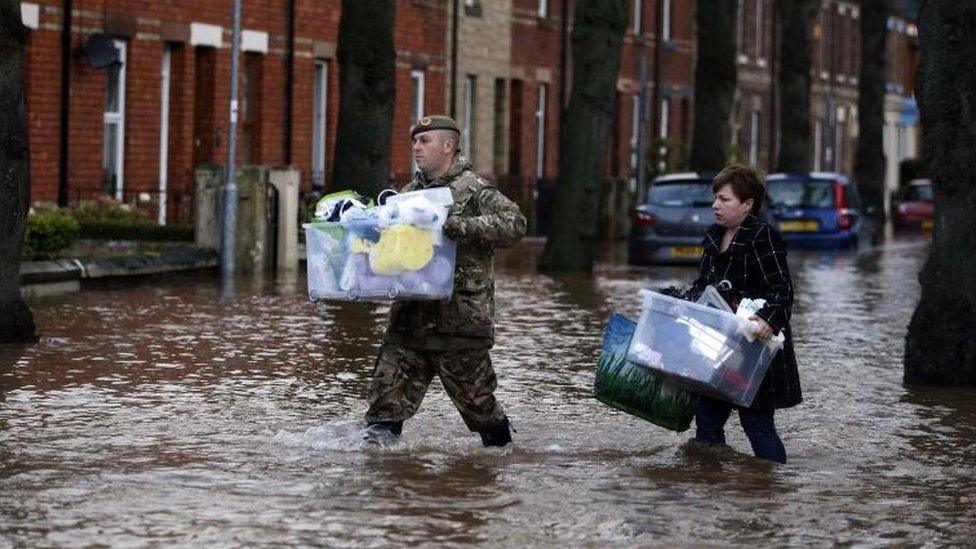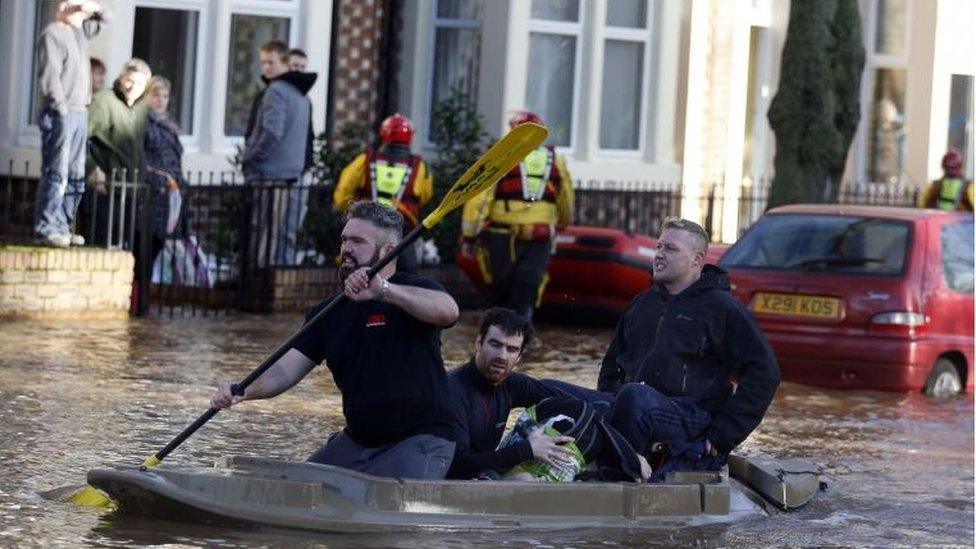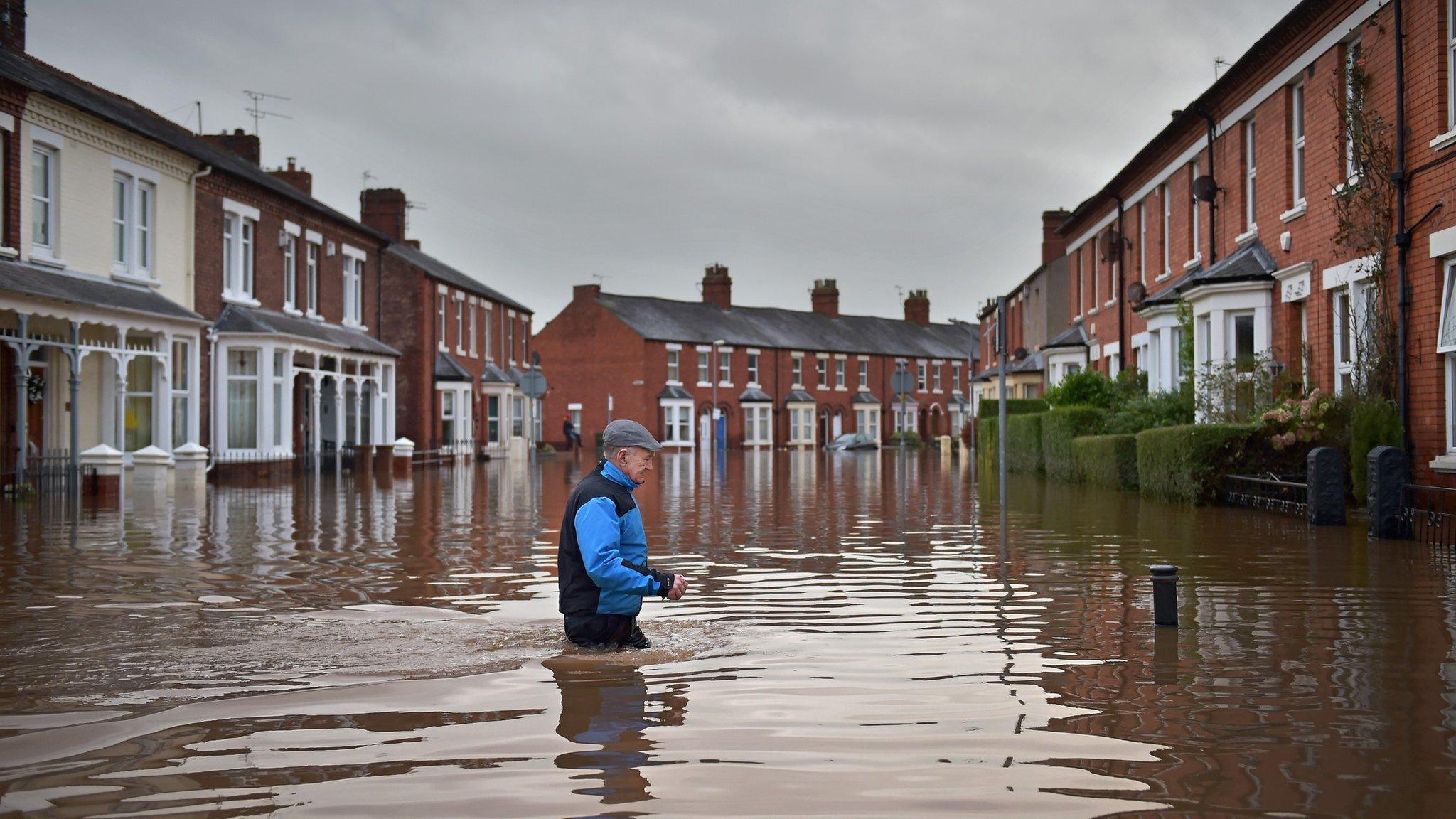Storm flooding: Insurance advice for flooding victims
- Published

Insurers say a "small army" of claims managers have been deployed to flood-hit areas, but they have urged affected residents to follow advice to protect any claims.
Rapid response teams are now sent by insurance companies to major incidents, following criticism of their reaction to the UK's 2007 deluge.
Householders hit by Storm Desmond and its aftermath have been told to stay safe, but to act to reduce risks of further damage or loss.
This includes locking up unattended homes and keeping evidence of damage.
Thousands of homes were evacuated or left without power in Cumbria after Storm Desmond hit northern England and Scotland.
And some people and their homes and businesses are threatened by repeat flooding.
Mark Shepherd, of the Association of British Insurers (ABI), said insurers would be staffed over the Christmas holidays to deal with fresh claims.
"Everyone hopes the flood waters stay away over the Christmas break, particularly for residents of Cumbria who have already seen their properties inundated more than once in the past few weeks.
"People affected by flooding will be able to pick up the phone to their insurer on Christmas Day to get help, and work will start straight away on assessing damage and making emergency payments where needed.
"Sadly there was also flooding over the Christmas and New Year period in the winter of 2013 and we saw then that many loss adjusters were on the ground the same day to help people affected," he added.
Advice from the British Insurance Brokers' Association to those affected includes:
Do make simple emergency repairs: If possible take photographs of the damage first and keep all quotes and receipts.
Leave dangerous work such as fixing the roof to professionals
Turn the power off, if safe, in a flooded home
Ensure homes are safe and secure before leaving to prevent further loss
Keep damaged items for evidence of a claim.
Meanwhile, many business insurance policies cover damage to premises and stock, but loss of trading owing to interruption is usually only covered if firms have paid an extra premium as an add-on to their policy.
How does this compare to previous flooding?

At present, the recent flooding is not the worst to have hit the UK, with about 6,570 homes and businesses having been flooded so far.
The frustration and upset for many of those affected is that they have been hit before.
For example, Cumbria was hit by devastating floods in 2005 and 2009.
Some 25,000 flood and storm claims were made to insurers following the 2009 floods, with £174m paid out.
All these incidents were still far smaller than the 2007 floods across swathes of the UK, which led to claims of £3.2bn.
What compensation is available to those without power?
There is provision in place for compensation to be paid to those who suffer lengthy power cuts as a result of storm damage.
The amount of time that power is off and the severity of the storm are key to compensation levels.
They are currently being assessed.
Will this affect future insurance claims?
A guide has been published, external for those wanting to obtain flood insurance who live in areas at high risk of flooding.
Many of these householders are concerned about high premiums, high excess and a lack of access to insurance.
A new scheme, known as Flood Re, has been agreed between the government and insurance industry and is planned to start in April.
Under the scheme, residential homeowners in areas with the highest flood risks should be able to shop around for insurance, because the extra risk involved will be passed from the insurer to an industry body, called Flood Re, which is sponsored by the government.
Insurers will choose which properties are deemed suitable for the scheme.
Businesses, including landlords, are not covered by the programme.
Brendan McCafferty, chief executive of Flood Re, said he expected insurers to be more likely to use the system now, with the latest flooding impact coming so close to the launch date.
There is an issue for those whose insurance renewal is due before April.
Mr McCafferty said these householders might decide that cancelling an existing policy a few months into the year - which might also incur a charge - and shopping around for a new deal, would be a cheaper option once the system was operating.
- Published7 December 2015

- Published6 December 2015
